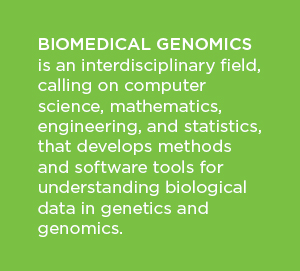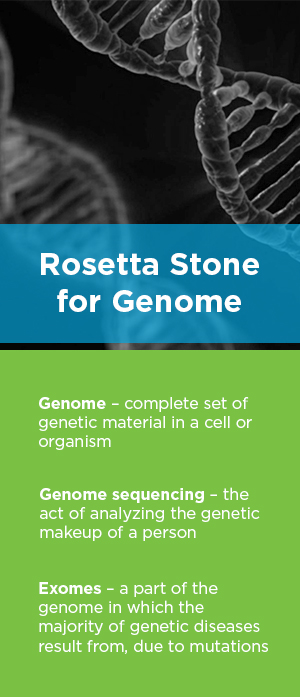GenomeNext Is Building a Startup on Know-how and Relationships
James Hirmas, founder and CEO of GenomeNext, has been engaged with Amazon Web Services (AWS) and cloud computing from the formative days.
He’s also worked with multiple clients who have the most challenging regulatory and cyber security needs. Plus, Hirmas understands how to architect big data solutions.
 So it was no surprise when, in late 2013, that Amazon came to Hirmas with a customer that had a unique need and a very disruptive (in the best sense of the word) big data opportunity in biomedical genomics.
So it was no surprise when, in late 2013, that Amazon came to Hirmas with a customer that had a unique need and a very disruptive (in the best sense of the word) big data opportunity in biomedical genomics.
That customer was Nationwide Children’s Hospital (NCH).
And a powerful strategic partnership between Nationwide Children’s and GenomeNext was born.
Expanding Clinical Genomics Services for Patients and Families
 Nationwide Children’s is deeply engaged in leading edge genomic research and genomic-based clinical care.
Nationwide Children’s is deeply engaged in leading edge genomic research and genomic-based clinical care.
The foundation for this science is genome sequencing.
Researchers at Nationwide Children’s, led by Peter White, Ph.D., principal investigator and director of the Biomedical Genomics Core, have developed an algorithm (they named it “Churchill”) that performs genome sequencing exponentially faster than other genome sequencing options with virtually 100 percent accuracy.
But for Nationwide Children’s, an amazing algorithm wasn’t enough.
Genome research is all about statistically analyzing large populations, think 1,000+ patients or more. That calls for enormous compute power and storage capacity.
“Sequencing just one human genome can produce up to one terabyte of data,” Hirmas said. “Researchers are targeting mapping hundreds of thousands of patients in single studies alone. The data explosion is happening.”
GenomeNext meets the computing, storage, and security challenges of high speed and high volume genome mapping.
Early this year, GenomeNext and Nationwide Children’s inked an agreement resulting in NCH integrating GenomeNext’s genomic analysis platform for routine clinical diagnostic testing and clinical research studies.
 The GenomeNext Software as a Service (SaaS) solution is delivered through the Amazon compute cloud. “We solve some unique business problems within the scope of the genome,” Hirmas said.
The GenomeNext Software as a Service (SaaS) solution is delivered through the Amazon compute cloud. “We solve some unique business problems within the scope of the genome,” Hirmas said.
- First, there’s the compute time that genome sequencing takes. Depending on the devices used, Hirmas said that before GenomeNext, the sequencing process could take weeks and may require multiple super-computers to get the job done.
“Go back to the 1,000 patients that need to be analyzed,” Hirmas said. “If you only have the capacity to do one at a time, and it takes two weeks to analyze each person, it’s going to take a very long time to product a statistically relevant sample size.”
Churchill can distribute the genomic analysis over multiple computers and/or servers. “When you are looking at a patient coming in with a rare disease, turnaround can be days, leveraging the GenomeNext platform, instead of weeks or months,” Hirmas said.
- Second, there is the quality and accuracy of the result, critical for effective patient diagnosis. “Churchill is extremely accurate and 100% reproducible,” Hirmas said. “Whether the algorithm runs on a server, a super computer, or in the cloud, it produces the same result;” performance capabilities which have been an unmet need in the industry.
The algorithm has benchmarked performance of genome sequencing with an accuracy of 99.99 percent and an overall diagnostic effectiveness of 99.66 percent, benchmarked against the standards established by the National Institute of Standards and Technology, the federal technology agency that works to develop and apply measurements and standards.
- Third, GenomeNext addresses the huge online storage capacity that this volume of data requires by using the Amazon cloud, where there are petabytes (one quadrillion bytes) of storage waiting. The platform is provider and hardware independent.
“The promise of the cloud is that we don’t have to be limited by compute power or data storage,” Hirmas said. “The cloud is like a utility, and we treat it as such. Our customers only pay for what they use. They don’t have to worry about capacity planning, procurement, management, or cyber security. They upload their data and it’s available immediately.”
The bottom line is that GenomeNext has built a secure platform that removes the computational and capacity constraints that have limited the translation of biomedical genomics into clinical practice and patient care.
“We started this business because we thought it was going to impact the world,” Hirmas said. “We are dedicated to helping people and improving the standard of care and feel that genomics is going to solve some major problems and transition the healthcare industry from reactive to predictive.”

